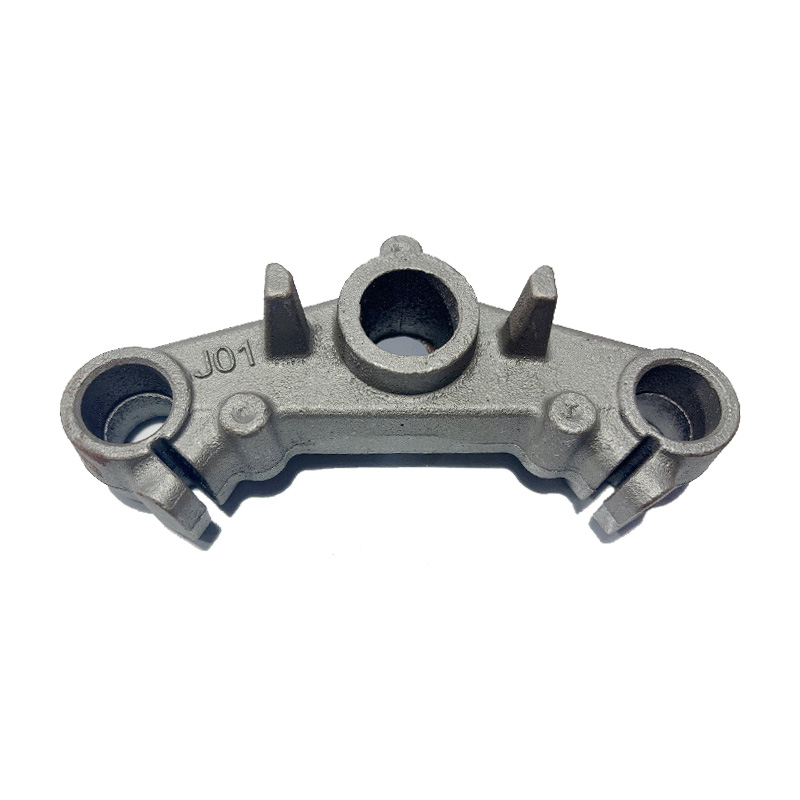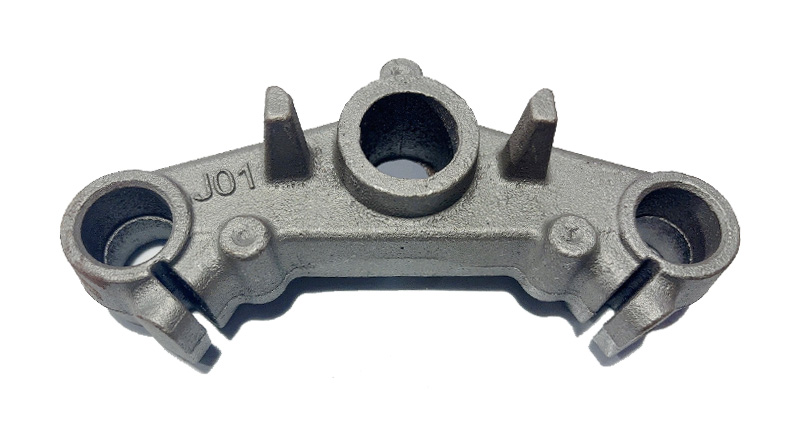

Steel Forging Under Bracket Precision Castparts are typically made through a combination of precision casting and forging processes, featuring high precision, high strength, and excellent surface quality. They are widely used in various fields such as aerospace, automotive manufacturing, and mechanical manufacturing, playing an important role as key components.

High precision:
The precision casting process enables precise control of the size and shape of these castings, meeting strict tolerance requirements. This is crucial for ensuring the assembly accuracy and performance of the components.
High strength:
The forging process improves the strength and toughness of castings by altering the microstructure of the metal. This enables these castings to withstand greater loads and is suitable for various high load working environments.
Good surface quality:
precision casting processes typically produce smooth, defect free surfaces. This not only reduces the demand for subsequent processing, but also improves the aesthetics and corrosion resistance of the castings.
Complex shapes:
Precision casting technology can produce castings with complex shapes to meet special design requirements. This makes these castings have broad application prospects in fields such as aerospace and automotive manufacturing.
Customization:
Due to the use of precision casting and forging technology, these castings can be customized according to the specific needs of customers. Whether it is size, shape, or material selection, they can be adjusted according to actual needs.
Material selection:
Choose suitable steel for casting and forging based on the usage environment and performance requirements of the casting. Common steel materials include carbon steel, alloy steel, etc., which have good mechanical properties and corrosion resistance.
Casting process:
Advanced casting techniques such as vacuum casting, pressure casting, etc. are adopted. These processes can ensure the quality and performance of castings, while reducing the occurrence of defects such as porosity and inclusions.
Forging process:
By heating, pressing, and cooling, the microstructure of the metal is changed to improve its strength and toughness. During the forging process, the shape of the castings can also be adjusted to meet specific design requirements.
Heat treatment:
Heat treatment of castings, such as quenching, tempering, etc. These treatments can further improve the mechanical properties and corrosion resistance of castings, and extend their service life.
Surface treatment:
According to actual needs, sandblasting, polishing and other surface treatments are carried out on castings. These treatments can remove impurities such as oxide scale and oil stains on the surface of castings, improving their aesthetics and corrosion resistance.
Aerospace: In the aerospace field, these precision castings are widely used in key components of aircraft, rockets, and other spacecraft. They bear enormous loads and complex mechanical environments, therefore requiring high precision, high strength, and good corrosion resistance.
Automobile manufacturing: In the field of automobile manufacturing, these precision castings are used for key parts such as engines, transmission systems, suspension systems, etc. They can ensure the stability and safety of the car, while improving its comfort and performance.
Mechanical manufacturing: In the field of mechanical manufacturing, these precision castings are used in key components of various mechanical equipment. They can ensure the normal operation and accuracy requirements of mechanical equipment, and improve the reliability and service life of the equipment.
Mold design and manufacturing: Design and manufacture suitable molds according to the design requirements of castings. The quality and accuracy of molds have a significant impact on the quality and performance of castings.
Smelting and pouring: Smelting the selected steel to obtain liquid metal that meets the requirements. Then pour the liquid metal into the mold and wait for it to cool and solidify to obtain the casting.
Forging and shaping: Forging treatment of castings to change their microstructure and improve strength and toughness. At the same time, the castings are shaped to meet specific size and shape requirements.
Heat treatment and surface treatment: Heat treatment is applied to castings to improve their mechanical properties and corrosion resistance. At the same time, surface treatment is carried out on the castings to improve their aesthetics and corrosion resistance.
Quality inspection and acceptance: Conduct comprehensive quality inspection on castings, including testing of size, shape, surface quality, mechanical properties, and other aspects. Delivery and use can only be carried out after ensuring that the castings meet the design requirements and quality standards.
For more information or to request a quote, please contact DONGRON Precision Manufacturing.
Email: info@dongron.com | Phone: +86-750-8382660 | Mobile: +86-139-2906-1677
Address: Block B, Industrial Zone 3, Hecheng Town, Heshan City, Guangdong Province, China.